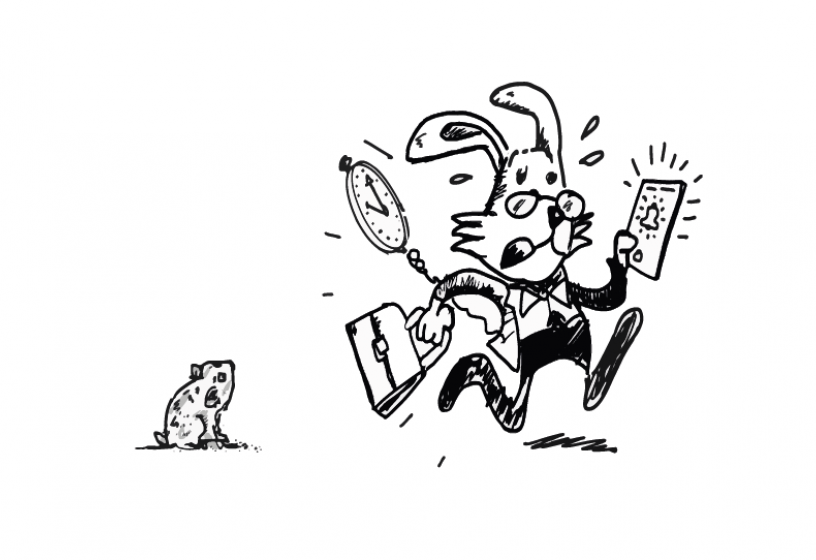Hyper-acceleration and Infobesity in Companies

Lighting by the specialist
Caroline Sauvajol-Rialland
INTERVIEW
Sustainability MAG: Which signs should call for attention regarding the hyper-acceleration and spinning phenomenon?
Caroline Sauvajol-Rialland: Profiles particularly prone to this phenomenon are the most invested people. They give the most, they respond to everything, and they never say no. When an employee responds to everything, including outside working hours, it means that he or she is permanently connected: the risk is real.
Even in a large international group, not all employees need to be connected 24/7. How did we manage 25 years ago? Companies also had international activities. We have to go back to the essential question of work organisation, which exploded with digital technology. Another worrying indicator is to respond systematically within a short time.
There are also external indicators sent by a person: signs of tiredness or stress are elements to be attentive to. When deterioration in professional relations is noticed, if “things are starting to go not too well” with an executive or a manager, it is time to feel concerned about it.
A gripping answer that comes up very frequently during my diagnostics within companies is “only I can handle my emails”. This sentence is typically an indication of the hyper-individualisation of work which is absolutely detrimental to firms and individuals. A proper work organisation presupposes a subsidiarity principle. If, in fact, within the business, there is only one person with a crucial competence, this is obviously dangerous for the organisation, and it encourages this person to an over-work-investment.
Is this phenomenon more significant according to generations?
Nowadays, there are four working generations with different job and time relationships. Baby boomers work very well with younger generations because they no longer have power stakes. They are interested in young people’s approaches. People from the X generation, they are in a position of power. They waited and threw themselves into getting here. Therefore, seeing the arrival of the Hyper-connected Y generation creates real collaboration issues. Indeed, they say what they think and give their opinion on everything while having high expectations from their managers and the company. And here is the Z generation entering the labour market. They demand a separation between their personal and professional spheres of life. This is even more difficult for the Xs because Zs are comfortable refusing to work outside of business hours. Organisations are going through a difficult transition period in terms of internal operations.
What would be your three pieces of advice to really save time?
The first word of advice is obviously to deactivate communication notifications and reactivate them three or four times a day. One must refuse others’ urgencies and, when necessary, refer people back to the fact that this or that request, which must be answered immediately, could have been made a week ago...
To avoid being asked for things urgently, it is essential to communicate how we work and our response delays regarding substantive files. For instance, if I am an HR-specialised or legal support service, I communicate about my file processing times. This means that a manager who would like to dismiss someone knows that between the time he or she sends me the person’s file and the time I will respond, at least three days will pass.
Finally, meetings efficient management is central to saving time. Is my presence essential? Did I receive the agenda? Did I prepare for the meeting? Was the timing respected? Are there minutes that make the action possible? Time savings associated with meetings’ optimisations can be enormous.
Is Slow digital possible? Or is it a utopia?
In my opinion, it is absolutely possible as a private matter. In fact, it is rather entertaining to note that a number of the most technophiles have opted for the slow for about ten years already! On private dinners, especially amongst younger people, it is not surprising to see a bucket to put phones in and with a simple rule: “the first person touching its phone buys dinner for everyone else”. On the professional side, it is way more complicated. To businesses, the idea of deceleration leans on a cultural sticking point. In that sense, to spare companies from running away, it is more relevant to talk about productivity, which is actually at the heart of the matter. By doing so, it resets the focus and explains that paradoxically reacting quickly does not mean being productive. Quite the opposite, to be productive, it is sometimes necessary to work on a disconnected mode. Infobesity’ most significant advantage is that organisations’ interests meet employees’ ones completely. When a firm hears: “Be careful. You are losing productivity. Your executives can not dedicate time to high value-added tasks anymore. Your innovation potential is decreasing. Internal relations are getting tense. Meanwhile, your employees are muddled up. Their health is suffering, absenteeism levels are rising...” Then it becomes possible to mobilise organisations on the matter of infobesity.
The real question, is how do we collectively organise ourselves to master infobesity. Today, each manager deals with this problem individually; and he or she often feels very isolated. There is a strong need for shared practices and collective regulations adapted to professions, employees and organisation’s activity.

Caroline Sauvajol-Rialland
is a trainer and teacher at Sciences Po Paris and at SO COMMENT, the corporate information management consulting firm she founded. Her reference book Infobesity: Understanding and Mastering the Information Surge was nominated for the Digital Book of the Year Award in 2013.
Also to be read in the dossier "Fast Mode":


